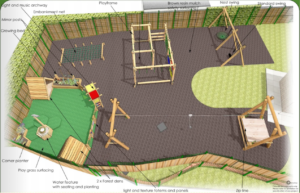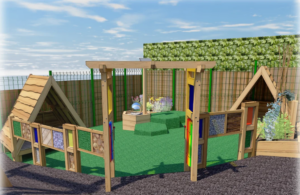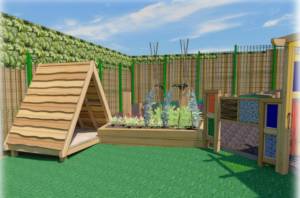We’re thrilled to unveil plans for a beautiful new sensory garden at Bushbury School, our brand-new school coming soon. This thoughtfully designed space will enrich students’ learning experiences, promoting sensory processing, enhancing communication skills, and fostering co-regulation.
A sensory garden offers numerous benefits for children with Autism Spectrum Condition (ASC) and Speech, Language, and Communication (SLC) needs. These gardens are designed to stimulate the senses through carefully chosen plants, textures, sounds, and elements that promote engagement and relaxation.
For children with ASC and SLC needs, sensory gardens can provide the following advantages:
Enhanced Sensory Processing
Children with ASC often experience sensory processing challenges, where they may be over- or under-responsive to certain stimuli. A sensory garden offers a safe environment to explore and interact with different sensory inputs (visual, auditory, tactile, proprioceptive, vestibular and olfactory) at their own pace. This can help them gradually improve their ability to regulate sensory information and their emotional state.
Support for Communication Development
The calming and engaging environment of a sensory garden can create opportunities for non-verbal and verbal communication. Children can describe what they see, feel, hear, or smell, promoting language development. Additionally, the garden provides a space for social interaction, development of gross motor skills, balance and coordination. Outdoor spaces can facilitate cooperative play and conversation between peers and education staff.
Reduction of Anxiety and Stress
Sensory gardens have a natural calming effect. Children with ASC and SLC needs often experience heightened anxiety, and the soothing elements of a sensory garden, such as gentle water features, soft foliage, or opportunity to movement can help them regulate. The tranquility of the environment can lower stress levels and contribute to emotional well-being.
Promotion of Focus and Engagement
Sensory gardens offer a variety of activities that encourage active engagement, whether through touching different textures, smelling fragrant plants, climbing or listening to nature sounds. These activities can capture attention in a way that traditional classroom environments may not.
Encouragement of Physical Activity
Sensory gardens can promote movement and motor skills. Activities like walking along pathways, climbing, or digging in the soil provide opportunities for children to develop their fine and gross motor skills. These physical activities are beneficial for overall health, emotional regulation and coordination.
Support for Emotional Regulation
Many children with ASC find it difficult to regulate their emotions. A sensory garden offers a calming space where they can retreat and self-soothe, using sensory experiences to ground themselves. For example, they might enjoy climbing, jumping or running, which can have a soothing effect when they feel overwhelmed.
Development of Independence and Confidence
A sensory garden allows children to explore and make choices in a safe and supportive environment. This encourages independence, self-confidence, and decision-making. The ability to interact with different sensory elements helps children gain control over their experiences, which can boost their self-esteem.
Stimulation of Imagination and Creativity
Sensory gardens can inspire imaginative play and creative thinking. Children with SLC needs, who may find traditional play more challenging, can use the sensory elements in the garden to create stories, games, or role-play scenarios, enhancing cognitive and social development.
Inclusivity and Accessibility
Sensory gardens are designed to be accessible for all children, regardless of ability. The adaptable nature of the garden allows for individualised experiences, ensuring that each child, regardless of their sensory or communication needs, can engage in meaningful ways.
In summary, sensory gardens offer a therapeutic and educational space that addresses the specific needs of children with ASC and SLC challenges, fostering growth in sensory processing, communication, emotional regulation, and physical development.
In addition to these benefits, our new sensory garden will be seamlessly integrated into therapeutic practices at Bushbury School, providing a valuable tool for our Occupational Therapists, Speech and Language Therapists, Psychotherapists and teachers. The garden will serve as a versatile space for both structured and free-form sessions. For example, activities such as following sensory trails or identifying various plants can be woven into the curriculum diet, making the learning process not only more enjoyable but also highly effective in supporting the development of key skills.
The garden will also encourage sustainability by incorporating eco-friendly practices such as native planting, recycling, and wildlife-friendly features. This will teach students about the importance of protecting our environment and give them hands-on experience with nature.
We are excited for the positive impact this garden will have on both the personal growth of our students and their understanding of sustainability!




